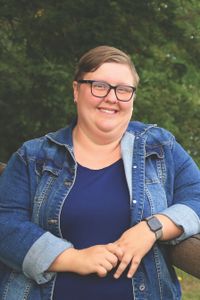Danielle A. Fienberg
Elections and appointments
Personal
Contact
Danielle A. Fienberg (Democratic Party) ran for election to the Maine State Senate to represent District 2. She lost in the general election on November 8, 2022.
Fienberg completed Ballotpedia's Candidate Connection survey in 2022. Click here to read the survey answers.
Biography
Danielle A. Fienberg was born in Huntington, Indiana.[1]
Elections
2022
See also: Maine State Senate elections, 2022
General election
Withdrawn or disqualified candidates
Democratic primary election
| |
|
Candidate |
% |
Total Votes |
Transfer |
Round eliminated |
| ✔ |
|
Laura Farnsworth |
|
656 |
0 |
Advanced (1) |

|
There were no incumbents in this race. The results have been certified. Source
|
Total votes: 656
|
 = candidate completed the Ballotpedia Candidate Connection survey. = candidate completed the Ballotpedia Candidate Connection survey. |
Republican primary election
| |
|
Candidate |
% |
Total Votes |
Transfer |
Round eliminated |
| ✔ |
|
Harold Stewart |
|
1,899 |
0 |
Advanced (1) |

|
Incumbents are bolded and underlined. The results have been certified. Source
|
Total votes: 1,899
|
 = candidate completed the Ballotpedia Candidate Connection survey. = candidate completed the Ballotpedia Candidate Connection survey. |
2022
Ballotpedia survey responses
See also: Ballotpedia's Candidate Connection
Danielle A. Fienberg completed Ballotpedia's Candidate Connection survey in 2022. The survey questions appear in bold and are followed by Fienberg's responses. Candidates are asked three required questions for this survey, but they may answer additional optional questions as well.
Expand all | Collapse all
Danielle Fienberg lives in Presque Isle with her husband John—a librarian—and their two young children. Having grown up in the Midwest and residing in several other states, Danielle and her husband knew the moment they discovered Northern Maine that it would be home.
Danielle has years of experience as an advocate in the communities she has lived in. Her most prominent achievement surrounds advocating for clean drinking water in New Jersey, serving as a lead for Infant and Early Childhood Mental Health for a national non-profit, and educating parents about and advocating for K-12 students with disabilities in public schools.
- Childcare as a Path to Prosperity:In Maine, the shortage of child care and special needs programs affects everyone, not just parents. Once these concerns are resolved, we'll finally be able to make headway in the current labor shortage, because more parents will be able to return to the workforce.
- Not Just Housing, Homes: Increased homeownership and improvements to rental units will benefit us all. When others in our community have a safe place to live, they are better equipped to enter the labor force. And as the properties surrounding us are improved, our neighborhoods become safer and more enjoyable places to live.
- S.M.A.R.T. Support for Schools (STEM, Music, Art, Remediation of Lead, Teachers): Lead in schools impacts us all. Lead exposure has been linked to impaired intellectual functioning and behavioral problems that can last a lifetime. This creates an additional strain on teachers and the school system, not to mention the hardships on lead-affected individuals and their surrounding communities as they grow up less prepared for life beyond school.
I am very enthusiastic about policies that lower obstacles to effective engagement in society for all members. This is a broad category, but it would include disability rights, assistance for our elderly population, and anti-poverty measures for children. When we assume that everyone begins on an equal footing and then base legislation on this fallacy, we end up with flawed legislation. From my perspective, flawed legislation has unexpected repercussions. Typically, those least able to face these repercussions do so. Careful and intelligent legislation would take into account these complexities—that we are not all created equal—and use them to craft policy that achieves its intended purpose and mitigates foreseeable issues.
Vote in accordance with the desires of your constituents without allowing your personal beliefs or ego to interfere. There is a considerable difference between the voters and their politicians in this country. As an example, Dobbs vs. Jackson Women's Health Organization, a case decided by the United States Supreme Court in June 2022. This case reversed Roe v. Wade, invalidating the constitutional right to abortion and reversing fifty years of precedent. According to Pew Research Center research from July 2022, 61 percent of Americans disagree with this judgment. The vote in Kansas on August 22 exemplified this further. A ballot initiative that would have modified the state's constitution to ensure abortion was not regarded as a protected right was overwhelmingly rejected by voters.
My greatest desire is to leave behind a legacy of service and sacrifice for the greater good. I also want my children to understand that being a member of a community entails helping its residents. It also involves making concessions.
The first incident that I can recall with clarity was the 1999 massacre of thirteen students at Columbine High School in Littleton, Colorado. It wasn't until I was 10 years old that I first understood that children may die. I experienced the societal repercussions of that massacre, and so will my children. Schools have implemented a zero tolerance policy for weapon ownership and threatening behavior by kids. Schools have also instituted new security measures, including transparent backpacks, metal detectors, school uniforms, and security guards.
The Last Herald Mage –The humanity of the characters and their development over time are illuminating. In addition to honor codes and oaths, the characters also adhere to their values even when under immense pressure. I respect that.
Everyone experiences the government, but not always in the same way. Marginalized communities are one such example. Maine is one of sixteen states with a part-time/citizen’s legislature ostensibly supposed to consist of individuals and not professional politicians. People from all walks of life with ordinary experiences are wanted. Knowledge, life experience, and empathy are considerably more beneficial than conventional political experience for drafting equitable laws.
Communities should not be clumped together or divided up to give any particular party an advantage. In the United States, elections should reflect the will of the people, not that of politicians. When defining the future of families and communities, all voices must be heard. Every person's requirements must be recognized and acknowledged. To draw new lines, it is vital to use the most neutral equation feasible. The maintenance of the community and the residents' voices are of the utmost importance.
Consensus is usually sought, occasionally required, but it is not always attainable. In a system where all parties are acting in good faith, compromise is generally achievable. In systems where certain legislators view policy as nothing more than poker chips and vote based on point acquisition, it may be challenging for those operating in good faith to find a true and equitable agreement. The legislative business must proceed even without it.
Note: Ballotpedia reserves the right to edit Candidate Connection survey responses. Any edits made by Ballotpedia will be clearly marked with [brackets] for the public. If the candidate disagrees with an edit, he or she may request the full removal of the survey response from Ballotpedia.org. Ballotpedia does not edit or correct typographical errors unless the candidate's campaign requests it.
See also
External links
- ↑ Information submitted to Ballotpedia through the Candidate Connection survey on August 5, 2022
Leadership
Senate President:Matthea Daughtry
Majority Leader:Teresa Pierce
Senators
Democratic Party (20)
Republican Party (15)



 = candidate completed the Ballotpedia Candidate Connection survey.
= candidate completed the Ballotpedia Candidate Connection survey. = candidate completed the Ballotpedia Candidate Connection survey.
= candidate completed the Ballotpedia Candidate Connection survey. = candidate completed the Ballotpedia Candidate Connection survey.
= candidate completed the Ballotpedia Candidate Connection survey.








